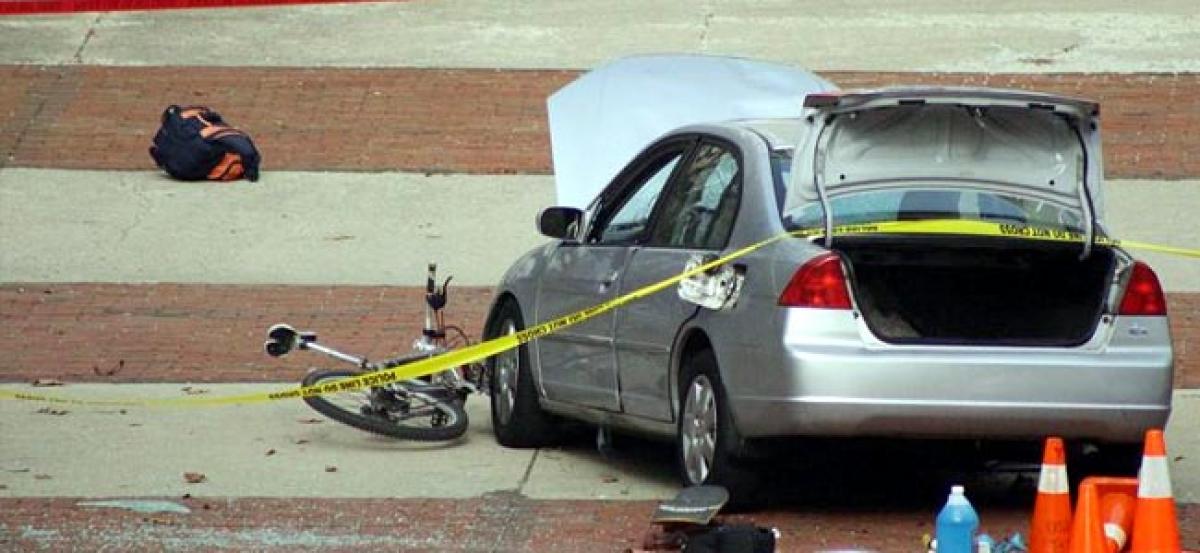Live
- Congress opens shop of lies & loot during elections: Rajasthan CM
- Indian startups raise over $182 million in funding this week
- Use of VPNs 'un-Islamic', declares Pakistan's Council of Islamic Ideology
- AP Dy CM, assembly speaker condoles death of former MLA Nara Rammurthy Naidu
- Senegal wraps up campaigning for legislative elections ahead of vote on Nov 17
- Free Study Materials Distributed to Needy MBBS Freshers by Seniors
- Boeing lays off over 400 members of professional aerospace union
- An egg a day may boost memory, brain functions in women: Study
- Ready for debate on BRS 10 year rule and Congress one year's, TPCC Chief Mahesh Goud
- Director Arjun Jandhyala speaks about ‘Devaki Nandana Vasudeva’
Just In

Immigrants in Columbus, Ohio\'s Somali community fear a backlash after a young immigrant injured 11 people in an attack at Ohio State University, the second attack by an African immigrant in the area this year.
COLUMBUS, OHIO: Immigrants in Columbus, Ohio's Somali community fear a backlash after a young immigrant injured 11 people in an attack at Ohio State University, the second attack by an African immigrant in the area this year.
With the second-largest Somali population in the United States, the area's 38,000 immigrants fear the college town and state capital may be less welcoming of foreigners.
The attack also comes at a time when President-elect Donald Trump has pledged to suspend immigration from countries where Islamist militants are active and new arrivals cannot be safely vetted.
"We are at the mercy of the community that allows us to be here," said Abdilahi Hassan, a 28-year-old restaurant owner who has lived in Columbus since he was 14.
Hassan said the assailant was not representative of immigrants from war-torn Somalia. "There are always some bad apples," he said.
The assailant, Abdul Razak Ali Artan, 20, was shot dead by a police officer on Monday moments after he plowed his car into a crowd of pedestrians and then leapt out and began stabbing people with a butcher knife.
The Islamic State militant group claimed responsibility for the attack, and U.S. officials said that Artan may have followed the same path to self-radicalization as militants in a number of "lone wolf" attacks.
In February an immigrant from Guinea wounded several people when he attacked with a machete inside a Columbus restaurant.
Last year, a Somali-born naturalized U.S. citizen was arrested after authorities said he trained with the Syria-based Nusra Front and then returned to the United States to kill Americans.
If Monday's attacker, Artan, was radicalized, then it was by outside sources and could not have come from the Columbus community, said Burhan Ahmed, head of the Center for Somali American Engagement in Columbus.
"America saved Somalis. America is where every religion is respected," he said.
He added that the Somali and Muslim communities were trying to educate young people to counter propaganda on the internet from sources like the Islamic State. Most Somalis are Muslim but there are also Christians in the country.
Columbus Mayor Andrew Ginther met on Tuesday with a group of Somali immigrants, including religious and business leaders, to reassure them they were part of the city's fabric, city officials said.
The city government has a New American Initiative designed to help Somali refugees and other recent immigrants get settled. The program explains city services to immigrants and helps them navigate bureaucracy.
Tensions between immigrants and city residents are not unique and Columbus is prepared to deal with them, said Zach Klein, the president of the city council. He visited the Masjid Ibn Taymia Mosque on Tuesday in a show of support.
"We are the 15th largest city in the United States and we are going to have the same problems that other large cities have. We are not immune to them," he said.

© 2024 Hyderabad Media House Limited/The Hans India. All rights reserved. Powered by hocalwire.com







